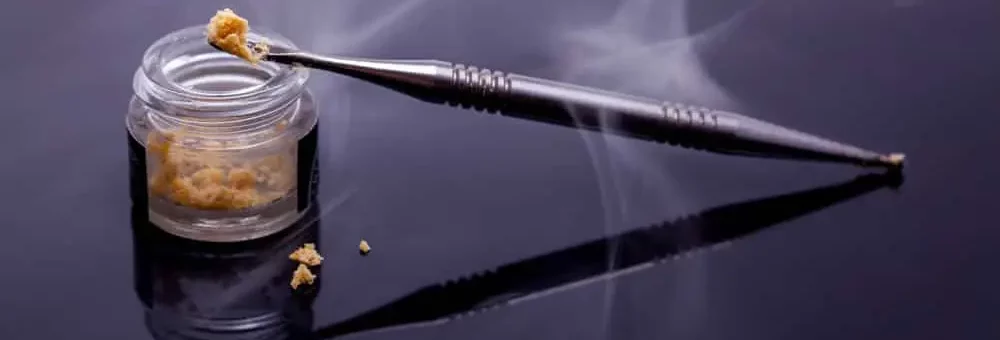
Is Dabbing Dangerous? Learn the Dab Drug Side Effects
Legacy Healing Center Blog
Dabbing has become a popular way to consume marijuana, particularly among younger adults and teens. It involves heating concentrated THC—often called wax, shatter, or budder—to create a potent vapor that’s inhaled. While some view it as just another way to use cannabis, the risks associated with dabbing are far greater than traditional marijuana use. At Legacy Healing Center, we believe it’s important to understand the dangers of dabbing, from its immediate side effects to the long-term consequences it can have on your body and mind.
What Is Dabbing and Why Is It So Potent?
Dabbing involves using highly concentrated forms of THC, the psychoactive compound in marijuana. These concentrates are far more potent than traditional cannabis, often containing 80-90% THC. For perspective, regular marijuana flower averages around 15-20% THC. This drastic difference means that the effects of dabbing are much stronger and hit faster.
To dab, users heat the THC concentrate on a metal or glass surface (often called a “nail”) using a blowtorch or vaporizer, then inhale the vapor it produces. Tools like dab rigs, electronic devices, and wax pens make the process easy but also increase the chances of misuse.
Dabbing is particularly dangerous because of its potency and how quickly it acts. For inexperienced users, this can lead to THC overdose symptoms like extreme paranoia, hallucinations, or vomiting.
Immediate Risks of Dabbing
While many people think of marijuana as harmless, the concentrated nature of dabs changes the equation. The immediate effects of dabbing include:
- Increased heart rate and elevated blood pressure
- Severe dizziness and nausea
- Intense paranoia and anxiety
- Hallucinations or extreme disorientation
One of the most overlooked risks is the potential for accidental injury. Tools like blowtorches, dab rigs, and high-heat surfaces increase the chance of burns or accidents, especially when used without proper caution.
Long-Term Side Effects of Dabbing
The long-term consequences of dabbing go beyond the physical effects seen in casual marijuana use. For those who regularly consume high-potency marijuana, the risks can include both respiratory issues and mental health problems.
The process of heating THC concentrates can release toxic chemicals. Poorly made THC concentrates may contain butane, pesticides, or heavy metals, which can harm your lungs over time. Chronic users often report coughing, lung irritation, and other symptoms consistent with respiratory damage.
On the mental health side, dabbing has been linked to worsening conditions like anxiety, depression, and even psychosis. This is particularly concerning for individuals predisposed to mental health disorders. Many who dab regularly develop marijuana use disorder, where dependency on THC begins to affect their everyday lives.
Signs of addiction include an inability to stop, needing higher doses to achieve the same effects, and experiencing withdrawal symptoms like irritability, insomnia, or mood swings. If you or someone you know is struggling, Legacy Healing Center offers comprehensive dabbing addiction treatment to address both the physical and psychological impacts.
Why Is Dabbing Addictive?
Dabbing is highly addictive because of the sheer potency of cannabis concentrates. Unlike smoking marijuana, where the effects build gradually, dabbing delivers an overwhelming amount of THC all at once. This quick, intense high can make the brain crave the experience repeatedly, leading to addiction.
Over time, users may find themselves needing larger and more frequent doses to achieve the same level of intoxication. This tolerance can spiral into dependency, where life begins to revolve around dabbing. Common signs of addiction include:
- Using dabs despite knowing the risks
- Neglecting work, school, or family responsibilities
- Experiencing intense cravings or withdrawal when not using
The Impact of Dabbing on Mental Health
Mental health is one of the areas most affected by dabbing. High doses of THC can worsen or trigger mental illnesses, even in individuals without a history of conditions like anxiety or depression. The effects can be even more severe for young people whose brains are still developing.
Long-term use of high-potency marijuana has been linked to:
- Anxiety and panic attacks
- Depression and mood disorders
- Psychotic symptoms, including paranoia and hallucinations
At Legacy Healing Center, we understand how closely addiction and mental health are connected. That’s why our programs include comprehensive care to address co-occurring disorders, ensuring that patients receive support for both addiction and mental health struggles.
Seeking Help for Dabbing Addiction
If you’re concerned about your relationship with dabbing or recognize the signs of addiction in someone close to you, seeking help is a crucial first step. Breaking free from dependency on THC concentrates isn’t always easy, but recovery is possible with the proper support.
At Legacy Healing Center, we offer a range of services to help individuals regain control of their lives, including detox programs, therapy, and personalized treatment plans. Our approach focuses on treating the whole person, addressing both the physical and mental toll of addiction.
Take the First Step Toward Healing
Is dabbing dangerous? The evidence is clear—dabbing carries serious risks that can affect your health, relationships, and future. The good news is that help is available. At Legacy Healing Center, we’re here to guide you through every step of recovery.
For more information, contact us today or visit our blog page to explore more helpful resources on addiction, recovery, and mental health. It’s never too late to take control and start living a healthier, more fulfilling life.
Related Readings:
